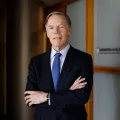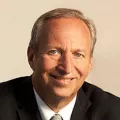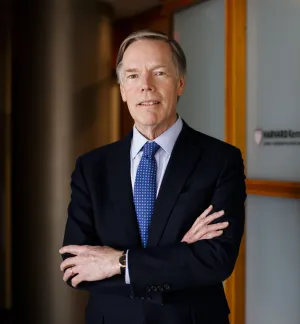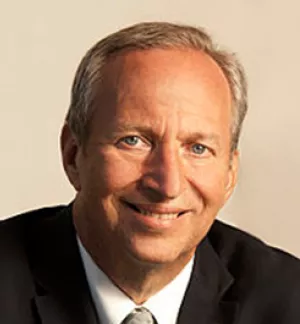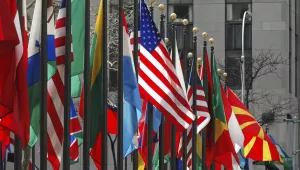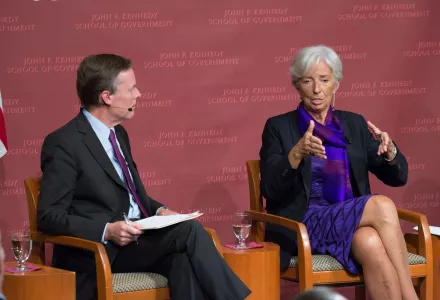
Professor Nicholas Burns reflects on Lagarde's statements on economics, climate change and female empowerment.
October 12, 2017
Christine Lagarde, managing director of the International Monetary Fund, spoke about economics, climate change, and female empowerment during an appearance last week (Oct. 5) at Harvard Kennedy School. The event in the JFK Jr. Forum was hosted by Lawrence H. Summers, the Charles W. Eliot University Professor and President Emeritus, and Nicholas Burns, the Roy and Barbara Goodman Family Professor of the Practice of Diplomacy and International Relations. Professor Burns provides his thoughts about the IMF leader’s visit below.
FROM PROFESSOR BURNS
Professor Larry Summers and I were very pleased to host IMF Managing Director Christine Lagarde on October 5 at the Kennedy School. We have created a new program on economic diplomacy to highlight its vital importance in the 21st century. Lagarde was our first visitor. She will be followed by former Secretary of Commerce Penny Pritzker in late October and former U.S. Trade Representative, Michael Froman in early 2018.
What struck me most about Lagarde’s prepared speech and subsequent conversation with our students was her contention that, in addition to economic growth and reform, traditional areas for the IMF to encourage and monitor, she sees a compelling need for governments to focus on climate change, the empowerment of women, the future of work and on corruption. I asked her about this in the Forum, saying it was unusual for an IMF Managing Director to stray from the central focus of the economy in one of her major public speeches of the year. She stuck to her guns in arguing that these additional challenges such as climate change will have an undoubted impact on the global economy.
I have been impressed for several years now by Lagarde’s leadership qualities and her professional and effective management of the IMF. She is clearly a strategic thinker, is articulate and unafraid to take on difficult questions. She is also most definitely a listener who connects well with her audience.
At dinner afterwards, I mused that if the 20 most powerful leaders in the world today were asked to choose who among them is most respected by the entire group they might very well conclude in a private poll that two women—Lagarde and German Chancellor Angela Merkel—are the world’s most trusted leaders.
Our students can certainly learn a lot from her careers in law, politics and international economics and from her combination of intelligence, discipline and commitment to the greater public good. We were delighted to welcome her to Harvard as our first Klein Fellow.

